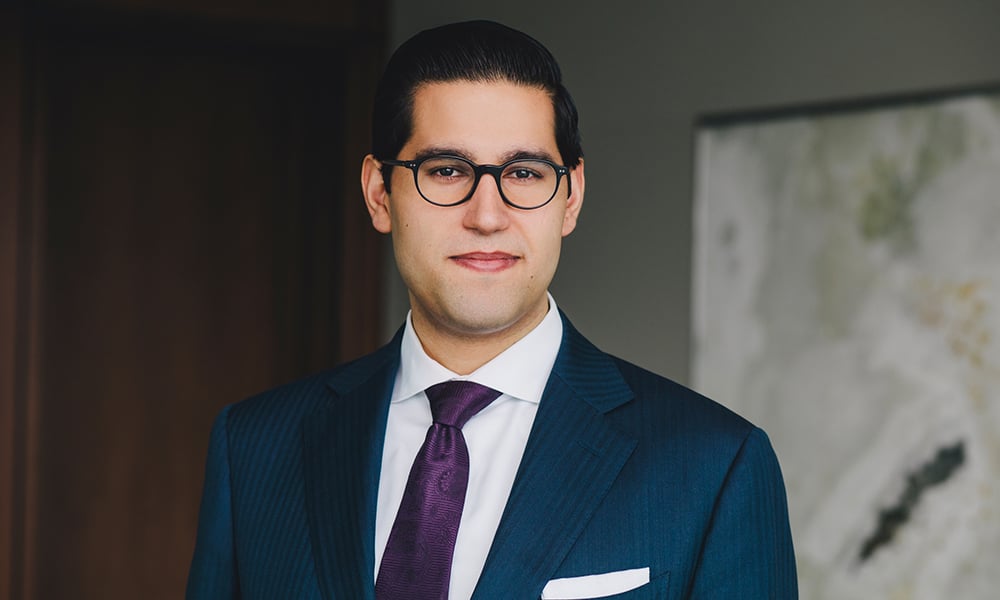
President hopes to cement work of past few years to grow organization further

In July the South Asian Bar Association of Toronto (SABA Toronto) held its annual general meeting, awarding student bursaries and electing new board members and a new executive.
Corporate lawyer Aarondeep Bains of Aird & Berlis LLP was elected for a second term as president, and said he looked forward “to working with our strong board and leading SABA Toronto as we work on important advocacy and diversity issues facing racialized licensees during the next year.” Jasmine Singh was elected as vice-president, Devin Persaud as treasurer and Annie Tayyab as secretary.
Looking forward to his second year as president, Bains told Canadian Lawyer that he would like to cement the work of the past few years, since he joined SABA Toronto’s board of directors in 2015, by expanding SABA across Canada; seeing more diversity on the bench, particularly in appointments in Ontario; and “leaving the organization in a strong position so that it can really be successful and have the institutional — both financial knowledge and governance — strength to really thrive after my term is done.”
SABA has four principal pillars, says Bains: networking, advocacy, professional development (Continuing Professional Development, technology), and pro bono work. The networking events, which are important in helping young lawyers meet more senior practitioners “and gain meaningful employment,” are of necessity being held virtually now, as is CPD. An inaugural four-part advocacy training webinar series was put on jointly by SABA Toronto and SABA Calgary, with other SABA chapters in Canada and the United States participating and listening to judges and leading litigators discuss trial, appellate and tribunal advocacy.
On the advocacy front, SABA does “soft lobbying” — in which Bains often meets with federal and provincial government to discuss changes in legislation, policies, and most importantly, promoting diversity on the bench — and formal advocacy work involving letter-writing and position papers. This past year, says Bains, SABA took positions on issues such as brownface (related to news of Prime Minister Justin Trudeau having appeared in such years earlier) and racial tensions in the U.S.
At the end of last year SABA applied to intervene in R. v. Chouhan, which concerns the constitutionality of the removal of peremptory challenges that defendants can use to remove a juror whom they feel will be biased toward their case. The organization has now been granted intervener status, and the chair of SABA’s advocacy committee will take the lead in that.
“We will continue some of our advocacy on opposing [Quebec’s] Bill 21, issues of racial discrimination in the legal profession, and trying to resist the campaign at the Law Society [of Ontario] to … disregard the tremendous work that the Law Society has done to date on diversity, equity diversity and inclusion, and other ad hoc things as they come up, all of which is in the broad mandate of increasing equity, diversity and inclusion in the legal profession.”
Bains is proud of SABA Toronto’s growth since 2015; then, there were around 500 members, he says, “but we’re well over 700 now. We’ve grown a lot, and we really would like to keep on that path.”
One of Bains’s goals was to build SABA across Canada. There is an established chapter in British Columbia, but the Toronto chapter didn’t have a strong connection with it, but now it does, says Bains.
As well, “We have a much more strong connection with SABA in North America. We helped create two chapters in Alberta: [in] Calgary and Edmonton. We're working on trying to create some chapters on the East Coast, so that we have more chapters across Canada and a way for South Asians, students and young lawyers to see themselves represented in the profession.”
The fledgling Calgary chapter “was a perfect example” of its members underestimating its potential for success, he says; “but I flew to their event, and they expected 10 to 15 lawyers to show up at the bar. We had 70 to 90 people come for that” in February. “There were a lot of young lawyers, and I think the older lawyers didn't quite realize how many South Asians are taking up the legal profession.”
SABA’s mandate isn’t simply “to have nice cocktail parties and networking receptions,” though, and not a week goes by, says Bains, “that he hasn’t been reached out to by junior lawyers and foreign-trained lawyers seeking education and employment while supporting a family, or by organizations to assist them and support various advocacy initiatives where they feel disproportionately prejudiced by legislation policies or other aspects of the law that might affect them.
“It's certainly been a challenge, because there've been a lot of issues, but I have to say it's been one of the most rewarding things I've done,” says Bains: “being able to see our members grow, our organization grow, and SABA really taking a prominent place in terms of being a recognized and respected stakeholder on EDI [equity, diversity and inclusion] issues.”
At its annual meeting SABA Toronto also awarded bursaries to Rono Khan and Shailaja Nadarajah of Queen’s University Faculty of Law, Gurvir Sangha of the University of Toronto Faculty of Law, and Jayashree Sivakumar of Osgoode Hall Law School at York University. All SABA Student Recognition Award Winners were selected on the basis of their outstanding contributions to their schools, SABA chapters and local communities, and on their academic achievements.